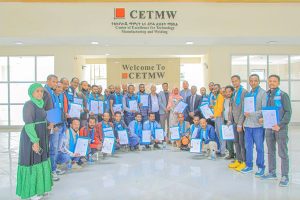
Ethiopia has been making significant strides towards embracing a digital revolution in recent years. The country’s leadership, recognizing the irreplaceable importance of technology in driving economic growth and improving the lives of its citizens, is working persistently to equip citizens with the essential tech knowledge and skills.
With a population of over 120 million, the potential for growth and development in the tech sector is immense. As a result, the government has been actively promoting digital transformation by implementing various initiatives and enhancing infrastructure, aiming to expand access to the internet, and fostering innovation thereby positioning the country as a significant player in the digital economy.
Providing affordable and reliable internet connectivity to all citizens, particularly those in rural areas can drive Ethiopia’s digital revolution. By improving access to the internet, the government hopes to spur innovation, create new business opportunities, and improve access to essential services such as healthcare and education.
It is recalled that four months ago, Prime Minister Abiy Ahmed (PhD) launched the 5 Million Ethiopian Coders Initiative at the Science Museum as part of the National Digital Ethiopia 2025 strategy aimed at bridging the digital skills gap.
According to the Office of the Prime Minister, this project is designed to benefit five million citizens with digital technology training. By 2026, the program aims to equip five million Ethiopian youth with foundational digital skills in Web Programming, Android Development, Data Science, and Artificial Intelligence…
In his remark while launching the program, the Premier emphasized that Ethiopia has hope through a forward-thinking youth population.
“The 5 Million Ethiopian Coders Initiative we launch today is a great opportunity,” he stressed.
The Premier called upon everyone to encourage the youth to register for the program, gain skills, and acquire international certification. He entrusted them to use this opportunity to create a movement aimed at producing 5 million Ethiopian coders within the next 3 years.
The Prime Minister expressed his gratitude to the government of the United Arab Emirates for their partnership in this project. “My greatest gratitude goes to the government of the United Arab Emirates for the partnership in this large scale capacity-building project,” PM Abiy remarked.
Prime Minister further stated that these 5 million coders will not only create innovative local solutions but also become a beacon of hope for our continent.
The 5 Million Ethiopian Coders Initiative is a collaborative effort between Ethiopia and the United Arab Emirates, aimed at training 5 million citizens in digital technology, artificial intelligence, and related digitization skills.
As part of the Digital Ethiopia 2025 plan, the number of startups in Ethiopia has surged from 50 to 950, benefiting entrepreneurs while generating jobs and expanding market access across the country, according to the Ministry of Innovation and Technology (MoIT).
MoIT State Minister Bayssa Bedada (PhD) emphasized the need for expanding critical infrastructure like energy to ensure broader access. “Energy expansion is underway in cities, and the telecommunications sector has also opened up with the entry of new operators,” he said.
The introduction of additional telecom operators fosters competition, improves service quality, and enhances access to digital markets. “This development is also connecting online financial services and increasing mobile user engagement,” he added.
The State Minister highlighted the significant role of startups in driving innovation. “The MoIT separated science, innovation, and technology sectors to provide targeted policy support, resulting in a dramatic increase in startups from 50 to 950,” he said. Bayssa credited the government’s commitment and policy reforms for this progress.
To further boost startups, the Ministry offers incentives and training to enhance their revenue potential. He encouraged more youth to engage with the Digital Ethiopia 2025 Initiative by developing new applications and digital solutions.
“Startups are not only solving problems but also generating income, providing fast and accessible services, and creating jobs simultaneously,” the State Minister noted.
Amir Redwan, Co-Founder of the successful startup Chip, shared his achievements in the agricultural sector. “We connect farmers directly with consumers, eliminating middlemen to offer affordable prices. So far, we have reached 70,000 customers and serve 3,000 orders daily with smooth transactions,” Amir explained.
The Digital Ethiopia 2025 Initiative continues to drive innovation, with startups playing a pivotal role in transforming the economy and offering sustainable employment opportunities.
Meanwhile, Ethiopia has made significant strides toward creating a thriving digital business environment through infrastructure development and policy reforms.
In a major milestone, the Alibaba Global Initiative (AGI), in partnership with the Digital Transformation Ethiopia Association (DTEA), inaugurated a global training center recently to equip Ethiopian entrepreneurs and business leaders with essential digital skills.
At the inauguration summit, Innovation and Technology State Minister Yeshurun Alemayehu (PhD) stated that the launch of the AGI training center represents a new era for Africa’s digital innovation, entrepreneurial growth, and technological progress.
“The country is laying the groundwork for digital transformation, aligned with national goals and the aspirations of the people. Through partnerships like the AGI program, we are empowering entrepreneurs with the necessary tools, skills, and resources to bring this vision to life,” Yeshurun said.
Minister-Counselor for Economic and Commercial Affairs at the Chinese Embassy in Ethiopia Yang Yihang emphasized that the collaboration between the two countries in the digital economy will unlock significant opportunities in the near future.
Senior Advisor at Alibaba and Co-Founder of Alibaba Global Initiatives, Dan Liu, highlighted the challenges Small and Medium-sized Enterprises (SMEs) face in global trade. These include complex trade routes, high logistics costs, and cross-border payment issues. “Through the Electronic World Trade Platform (eWTP), we are collaborating with various countries to empower SMEs via e-commerce, technology, logistics, and training initiatives,” Liu noted.
DTEA President FikirAndargachew stressed that the summit signifies a powerful commitment to digitalizing not only Ethiopia but also Africa. “This agreement offers a remarkable opportunity for 60 Ethiopian entrepreneurs who have undergone training with Alibaba’s team. They return with enhanced skills and renewed inspiration to play a leading role in shaping Ethiopia’s digital landscape,” she said.
The new training center is expected to serve as a hub for digital transformation, benefiting not just Ethiopia but the entire African continent.
According to experts, another important initiative is the creation of tech hubs and incubators to support the growth of the country’s tech ecosystem. These hubs provide a space for entrepreneurs, developers, and technologists to collaborate, innovate, and bring their ideas to market. By fostering a culture of entrepreneurship and innovation, the government hopes to attract foreign investment, create numerous jobs, and position Ethiopia as a hub for tech innovation in Africa.
Despite the progress made in recent years, Ethiopia still faces significant challenges on its journey to digital revolution. One of the biggest obstacles is the lack of infrastructure, particularly in rural areas where access to electricity and reliable internet connectivity is limited. Addressing these infrastructure gaps will be crucial in ensuring that all Ethiopians can benefit from the opportunities offered by the digital economy.
Another challenge is the need to build a skilled workforce capable of driving innovation and growth in the tech sector. While Ethiopia boasts a young and tech-savvy population, there is a shortage of individuals with the skills needed to develop and implement digital solutions.
Therefore, investing hugely in infrastructure development, education, and training programs will be essential in bridging this skills gap and equipping Ethiopians with the knowledge and expertise needed to succeed in the digital economy.
In sum, Ethiopia’s journey to digital revolution is well underway, with the government implementing key initiatives to expand internet access, support tech innovation, and create a thriving digital ecosystem. While there are challenges to overcome, such as infrastructure gaps and skills shortages, the future looks bright for Ethiopia as it leverages technology to drive economic growth and improve the lives of its citizens.
BY TEWODROS KASSA
THE ETHIOPIAN HERALD FRIDAY 8 NOVEMBER 2024





